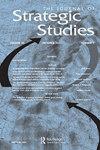印度ISR能力对南亚安全动态的影响
IF 2
2区 社会学
Q2 INTERNATIONAL RELATIONS
引用次数: 1
摘要
情报、监视和侦察(ISR)能力在过去二十年中呈指数级增长。几乎所有大国都在建设自己的ISR潜力,用于商业和军事目的,这为印度等其他新兴大国效仿并发展自己的跨域ISR网络提供了动力。这可能会对南亚的安全环境产生不利影响,印度和巴基斯坦这两个拥有核武器的国家仍然卷入军事竞争,并在过去多年中经历了几次严重的军事危机。获得新的ISR技术还可以激励印度利用其明显的常规军事优势对抗巴基斯坦,并冒险进入有限的武装冲突,以追求其在核威胁下的政治目标。由于长期的互不信任,这种企图可能迅速使冲突升级,有可能爆发全面战争,包括可能发生核交火。本文旨在讨论印度在所有四个战争领域(即太空、陆地、海上和空中)升级其ISR能力的雄心勃勃的计划;印美在数据共享方面不断发展的合作及其对巴基斯坦的影响。本文章由计算机程序翻译,如有差异,请以英文原文为准。
Impact of India’s ISR Capabilities on South Asian Security Dynamics
Intelligence, Surveillance and Reconnaissance (ISR) capabilities have grown exponentially over the past two decades. Almost all major powers are building their ISR potential for commercial and military purposes which has provided incentive for the other emerging powers such as India to follow suit and develop its own cross-domain ISR network. This is likely to adversely impact South Asian security environment where India and Pakistan, the two nuclear armed states, remain embroiled in a military competition and have experienced several serious military crises over the past many years. Acquisition of new ISR technologies could also provide incentive to India to exploit its apparent conventional military advantage against Pakistan and venture into a limited armed conflict in pursuit of its political objectives under a nuclear overhang. Owing to a long history of distrust such an attempt could quickly escalate conflict with the possibility of an all-out war including the potential for a nuclear exchange. This paper aims to discuss India’s ambitious plan to upgrade its ISR capabilities in all the four domains of warfare, i.e. space, land, sea and air; the evolving India-US cooperation in sharing of data and its implications for Pakistan.
求助全文
通过发布文献求助,成功后即可免费获取论文全文。
去求助
来源期刊

Journal of Strategic Studies
Multiple-
CiteScore
4.00
自引率
5.30%
发文量
40
期刊介绍:
The defining feature of The Journal of Strategic Studies is its commitment to multi-disciplinary approach. The editors welcome articles that challenge our historical understanding of man"s efforts to achieve political ends through the application of military and diplomatic means; articles on contemporary security and theoretical controversies of enduring value; and of course articles that explicitly combine the historical and theoretical approaches to the study of modern warfare, defence policy and modern strategy. In addition to a well-established review section, The Journal of Strategic Studies offers its diverse readership a wide range of "special issues" and "special sections".
 求助内容:
求助内容: 应助结果提醒方式:
应助结果提醒方式:


